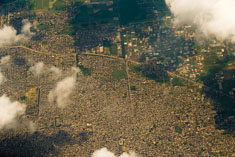-
Roger-Mark De Souza Talks Global Population Dynamics on ‘Radio Times’
May 7, 2015 By Linnea Bennett
From aging populations in East Asia, Europe, and the United States to youth in sub-Saharan Africa, changing demographics have implications for the entire global community, said Roger-Mark De Souza, director of population, environmental security, and resilience at the Wilson Center in an April 20 interview for WHYY’s Radio Times in Philadelphia.
From aging populations in East Asia, Europe, and the United States to youth in sub-Saharan Africa, changing demographics have implications for the entire global community, said Roger-Mark De Souza, director of population, environmental security, and resilience at the Wilson Center in an April 20 interview for WHYY’s Radio Times in Philadelphia.
Joining Population Reference Bureau demographer Carl Haub, De Souza surveyed the demographic landscape, including government efforts to raise birthrates in developed countries and expand access to family planning in developing countries.
“We know that population growth will expose more people to climate change impacts”Population dynamics affect a diverse set of sectors, particularly international development and the environment, De Souza said. Rapid growth in some sub-Saharan African and South Asian countries where people are reliant on subsistence farming and other local resources is driving biodiversity loss and reducing the resilience of communities to environmental and societal changes. “We know that population growth will expose more people to climate change impacts and make adaptation more difficult,” he said. “So really, it is compromising their future.”
In addition, “population growth is one of the factors that contribute to climate change, particularly for the more industrialized, wealthier countries that have high per capita consumption,” said De Souza. “So even for us in the United States and in the more industrialized countries, slower population growth can help decrease emissions.”
For those countries still growing, policymakers are looking to take advantage of the “demographic dividend,” he said, where a decline in fertility rates can lead to a disproportionate number of productive people entering the workforce and a temporary boon to productivity. This phenomenon was experienced in East Asia during the 20th century and many demographers are looking to Africa to come next.
On the term “overpopulation,” De Souza said this is something the population community is very sensitive to, following efforts in the past that were not respective of individual rights and choice. “That is a very subjective word: overpopulation from whose perspective? It’s very value-laden. And more often, there is a more detailed conversation about whether population is the real problem, or are there issues of underdevelopment, of depletion of resources and environmental destruction, of population distribution.” The focus should be on expanding voluntary, informed choice to reproductive health services, he said.
Audio: WHYY.
 A Publication of the Stimson Center.
A Publication of the Stimson Center.




